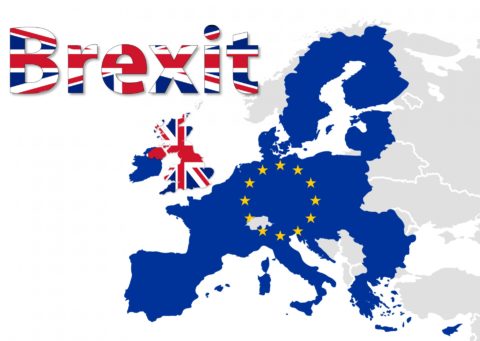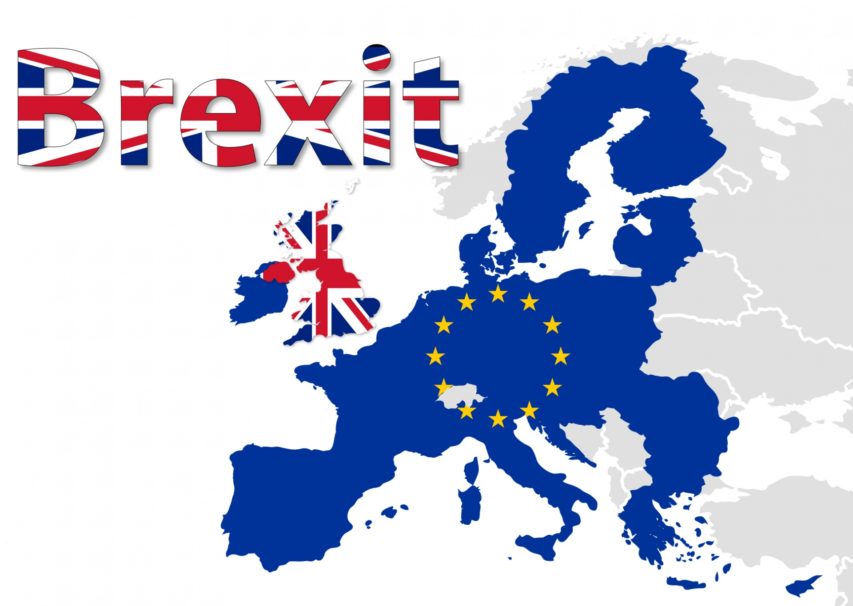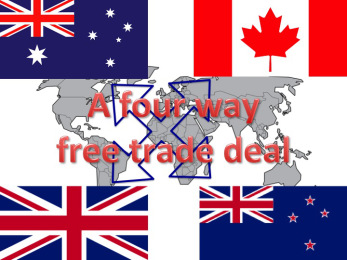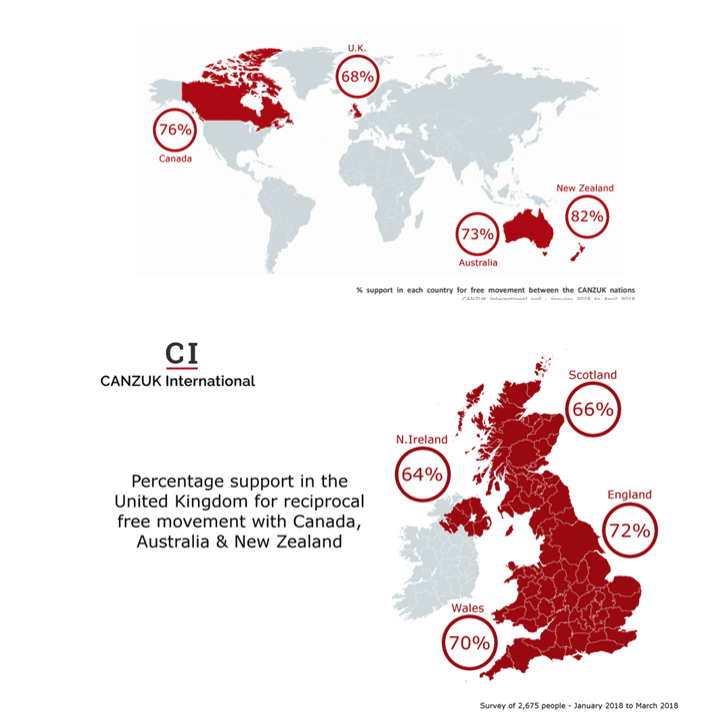It is a myth that free trade is unproven in practice. Forget that countries with freer trade have both higher per-capita incomes and faster rates of economic growth. Look instead at the essentials of the case. Each and every day you trade freely with many merchants. Do you think that you and your family would be enriched if your neighbor extracted punitive payments from you whenever you buy some item that your neighbor judges to be from a seller located too distant from your neighborhood? Every day Arizonans trade freely with Texans and Rhode Islanders. Do you think that Arizonans would be enriched if the government of that state obstructed their ability to trade as they choose with people located in other states?
People trade freely countless times, each and every day. Yes, yes, I’m well aware that such trade isn’t ideally free. Occupational-licensing restrictions, for example, unjustly and harmfully obstruct domestic trade. But the fact remains that today within each country – including within the U.S. – trade is not typically obstructed based on geographic location or political boundaries. And therefore people buy and sell freely within countries. If the case for a policy of free trade were not practical – if it were only a theoretical curiosity – then it would be true that ordinary people would be even richer if the state obstructed their abilities to trade with each other domestically.
It’s a myth also that the economic case for a policy of free trade in any one country requires that other governments also practice free trade. The case for a policy of free trade is, at bottom, a case for unilateral free trade: while nearly everyone in the world would be better off if all governments adopted policies of free trade, nearly everyone in the home country would be better off if the home government adopts a policy of free trade regardless of the policies of other governments.
Protectionism is a nasty mash of logical fallacies, half-truths, hubris, economic ignorance, and cronyist apologetics.
Don Boudreaux, “Quotation of the Day…”, Café Hayek, 2017-12-18.
March 10, 2020
QotD: Free trade versus protectionism
January 23, 2020
The EU apparently fears a “Singapore on the Thames”
In the Continental Telegraph, Tim Worstall explains why the EU negotiators are reportedly offering a much worse trade deal to the United Kingdom than they’ve already agreed with Canada, Japan, and other trading partners:
Take, for example, this idea of Singapore on Thames. It’s trivially easy to rally the peeps against one or other relaxation of regulation. Chlorine washed chicken for example. But what about lifting the entire burden? Singapore is, after all, about 50% richer than Britain on a per capita basis. The correct question therefore is would you like a 50% pay raise at the price of shooting all the bureaucrats? Given the manner in which the bureaucrats don’t want the question even asked we have a reasonable enough guide that the answer would be yes.
Which is why the terms on offer to a Britain which could do the SonT thing are so terrible. Because of SonT succeeded it would be a death blow to the entire idea of how Europe is regulated. Lille, Leipzig and Livorno will all put up with interfering bureaucracy because that’s just the way the world is. But if Les Rosbifs become richer by half again simply by that bonfire of the regulations then the auto da fes will light up all over Europe.
So, yes, of course the EU is offering shit trade terms. They can’t allow an independent and free Britain to succeed. That we will anyway is what will bring that freedom and liberty to the continent – once again. For as so often it will be us that saves Europe from itself.
January 9, 2020
Addressing overblown fears of “regulatory divergence” after Brexit
Tim Worstall explains why worries about “regulatory divergence” are not very sensible:
So now we get to – having agreed that Brexit is going to happen – having to decide what the new trade deal is going to be. At which point there are all sorts of people insisting that we shouldn’t have regulatory divergence. Yet gaining that regulatory divergence is the very point of our having Brexit. We want to be able to do things differently than the European Union.
Thus this sort of worry is thinking about it the wrong way around:
Brexit is nearly done, but don’t expect an easy ride on trade. The EU is terrified of regulatory divergence
We are still very much in the early honeymoon period of the new Government, when flush with a stunning election victory all things seem possible. Even the traditionally hostile Financial Times seems to have been partially won over by the infectious optimism that for now flows through the nation’s veins, warming to some of the opportunities for positive change that Brexit may allow.
Yet at some stage, with the feelgood mood colliding with harsh realities, there is going to be a comedown. The first of these awakenings is likely to centre on trade.
In reaching a trade deal with the EU by the end of the year as promised, the Government will either have to compromise on scope for regulatory divergence, …
The point being that since the divergence is the very thing we want it’s not the thing to compromise upon.
Start from the very basics. There is no version of voluntary trade that is worse than autarky. There are versions of trade that are better than simple unilateral free trade. Like, for example, the other people adopting unilateral free trade too.
So, our baseline starting point for any negotiation on trade is that any trade is better than none, but we must measure any specific proposal against the effects of unilateral free trade. If it would be better to have this extra thing then all well and good, let’s have it. But if the conditions attached to that make the overall deal worse than the unilateral position then we should not have it.
For example, UK farm goods gaining tariff and quota free access to the EU would be a nice thing to have. But a likely cost of that is that British consumers would not be allowed tariff and quota free access to the farm goods of the rest of the world. The cost of that second is greater than the benefits of the first – we don’t do it therefore.
On regulation much the same becomes true. The negotiating stance at least. What would be the paradisical effect of a system of perfect regulation? Not that one exists nor ever will but that’s what we need to imagine. Then, anything we’re asked to accept which is worse than this has to be tested for whether what we lose from the restriction is worth what we then gain elsewhere.
Given EU regulation this is always going to lead to the answer “No”.
November 15, 2019
QotD: Understanding trade policy
You live on a block on Elm St. which has two other households: the Joneses and the Jacksons. Suppose your neighbor Jones puts a knife to your throat and threatens to kill you unless you either buy your tomatoes from him or, if you insist on buying tomatoes from a grower across town, pay him a fine for each across-town tomato that you buy. You immediately understand that Jones is violating your rights; you immediately understand that Jones is a thug, pure and simple. No amount of philosophy, economics, political science, or theology will change your assessment.
Now let Jones secure Jackson’s approval for his actions. Jackson expresses his approval not only of Jones obstructing your freedom to buy across-town tomatoes, Jackson also approves of Jones taking some of your money directly to help Jones pay for the employment, arming, and dressing up in fancy costumes of a street gang who will do the actual dirty work of caging or killing you if you refuse to abide by the tomato-buying terms that Jones imposes on you.
When you object to the injustice of Jones’s actions, he reminds you that you had a vote in this matter. But being outvoted 2 to 1, this majority outcome, by some mystical process, transforms Jones’s pure and simple thuggery into perfectly acceptable – even noble – “trade policy” the violation of which would make you the anti-social criminal.
Further, Jones, to his delight, discovers that Jackson has been hard at work on a treatise that details the many dangers of allowing you to buy your tomatoes without obstruction from across town. Jackson’s treatise even has empirical data on the number of tomatoes and labor hours that would no longer be grown and and worked on your Elm St. block if you are left free to buy your tomatoes unobstructed. Combined with criticisms of “simple-minded” defenses of free trade and with explanations that tomatoes grown across town are sold at unfairly low prices, Jackson’s treatise rids Jones of the few qualms that Jones’s threats of violence against you caused him to suffer from time to time
Thus is “trade policy.”
Don Boudreaux, “Quotation of the Day…”, Café Hayek, 2017-10-23.
September 15, 2019
Explaining Brexit to liberal Americans
Andrew Sullivan tries to put the Brexit debate into terms that coastal, urban Americans can understand:
One of the frustrating aspects of reading the U.S. media’s coverage of Brexit is that you’d never get any idea why it happened in the first place. Brexit is treated, automatically, as some kind of pathology, a populist act of wanton self-harm, an absurd idea, etc etc. And from the perspective of an upstanding member of the left-liberal media establishment, that’s all true. If your idea of Britain is formed by jetting in and out of London, a multicultural, global metropolis that is as lively and European as any city on the Continent, you’d think that E.U. membership is a no-brainer. Now that the full hellish economic consequences of exit are in full view, what could possibly be the impulse to stick with it?
I get this. I would have voted Remain. I find London to be far more fun now than it was when I left the place. But allow me to suggest a parallel version of Britain’s situation — but with the U.S. The U.S. negotiated with Canada and Mexico to create a free trade zone called NAFTA, just as the U.K. negotiated entry to what was then a free trade zone called the “European Economic Community” in 1973. Now imagine further that NAFTA required complete freedom of movement for people across all three countries. Any Mexican or Canadian citizen would have the automatic right to live and work in the U.S., including access to public assistance, and every American could live and work in Mexico and Canada on the same grounds. This three-country grouping then establishes its own Supreme Court, which has a veto over the U.S. Supreme Court. And then there’s a new currency to replace the dollar, governed by a new central bank, located in Ottawa.
How many Americans would support this? How many votes would a candidate for president get if he or she proposed it? The questions answer themselves. It would be unimaginable for the U.S. to allow itself to be governed by an entity more authoritative than its own government. It would signify the end of the American experiment, because it would effectively be the end of the American nation-state. But this is precisely the position the U.K. has been in for most of my lifetime. The U.K. has no control over immigration from 27 other countries in Europe, and its less regulated economy has attracted hundreds of thousands of foreigners to work in the country, transforming its culture and stressing its hospitals, schools and transportation system. Its courts ultimately have to answer to the European Court. Most aspects of its economy are governed by rules set in Brussels. It cannot independently negotiate any aspect of its own trade agreements. I think the cost-benefit analysis still favors being a member of the E.U. But it is not crazy to come to the opposite conclusion.
More to the point, the European Economic Community has evolved over the years into something far more ambitious. Through various treaties — Maastricht and Lisbon, for example — what is now called the European Union (note the shift in language) has embarked on a process of ever-greater integration: a common currency, a common foreign policy and now, if Macron has his way, a common central bank. It is requiring the surrender and pooling of more and more national sovereignty from its members. And in this series of surrenders, Britain is unique in its history and identity. In the last century, every other European country has experienced the most severe loss of sovereignty a nation can experience: the occupation of a foreign army on its soil. Britain hasn’t. Its government has retained control of its own island territory now for a thousand years. More salient: this very resistance has come to define the character of the country, idealized by Churchill in the country’s darkest hour. Britain was always going to have more trouble pooling sovereignty than others. And the more ambitious the E.U. became, the more trouble the U.K. had.
August 18, 2019
QotD: “Hitting back” at protectionist policies
You buy lawn-care services from company XYZ located on the other side of town. Your neighbor, Mr. Stump, takes it upon himself to hold you up at gunpoint to the tune of $25 each time you buy services from XYZ rather than from Stump’s teenage son. You are less powerful than Stump and, not being suicidal, you pay the “tariff” that he officiously demands. But Stump is a magnanimous fellow, and so he agrees to a deal with XYZ: Stump drops his tariffs on your purchases from XYZ in return for XYZ agreeing to raise the price it charges you by $15.
But soon a trade dispute erupts. Stump discovers – correctly, we can assume – that XYZ is charging you less for its lawn-care services than Stump agreed is acceptable for you to be charged and that XYZ agreed in the trade deal to charge. Stump, being a master negotiator, threatens to reimpose the $25 tariff on you unless and until XYZ raises the price it charges you to at least the level that Stump has divined is acceptable and that is enshrined in the terms of the trade agreement between him and XYZ. Alas, XYZ gives in and agrees to raise the price it charges you. Stump then boasts that, by not letting XYZ get away with breaking its word in the trade deal, he is not only protecting the neighborhood from dangerously low prices but is also upholding the sacred rule of law and the sanctity of contractual agreements.
Of course, in reality, Stump’s presumptuous exercise of the power to
rob youimpose a tariff on you whenever you engage in commerce that he finds objectionable is a wrong inflicted on you and on your trading partner, XYZ. The fact that the practicalities of the situation result in your and XYZ going along with the “deal” to entice Stump to stop robbing you each time you buy XYZ’s services does not ethically oblige you to stick to the terms of the deal if you can, in secret, get better terms from XYZ. When Stump threatens to reimpose on you the $25 tariff, he harms you. That is, when in response to Stump’s threat to reimpose the tariff XYZ agrees to abide by the terms of its trade agreement with Stump and raise the price that it charges you, you are made worse off, not better off.Stump’s enforcement of this agreement, in short, does not protect you from further victimization in the future; instead, that enforcement is itself an act of victimizing you. Successful enforcement of this agreement assures you a future less prosperous than it would be were Stump instead to ignore XYZ’s “violation” of the deal.
Note: we can all agree that, between the two options (1) $25 tariff and (2) no tariff but an enforced price-hike, under the trade agreement, of $15, that the second option is better for you than the first option. It is in this limited sense that trade agreements in reality are beneficial. But there’s a third option: (3) Stump does not interfere with your commerce and you pay whatever price you negotiate with XYZ without that price being artificially affected by Stump’s interference. This third option is, for you, the best of the three – and it’s the only fully ethical one of the bunch. (So when Dan Griswold, myself, and other free-traders defend trade agreements, we do so with the realistic recognition that option (3) is politically infeasible. Given this unfortunate infeasibility of option (3), we endorse option (2) over option (1).)
Don Boudreaux, “Strict Enforcement of an Impoverishing Deal Assures Continuing Impoverishment”, Café Hayek, 2017-07-07.
July 26, 2019
Post-Brexit, consider CANZUK
Tom Colsey explains why in a post-Brexit world, CANZUK might be an attractive economic alternative:
One possible option would mean the island nation would initially turn away from Europe toward certain anglophone Commonwealth nations and former colonies. I talk, of course, of the promising CANZUK proposal that would see Canada, Australia, New Zealand, and the United Kingdom band together with voluntary agreements on multilateral free trade and movement, forming a bloc that would singularly hold the third largest nominal GDP in the world.
The Free Movement Proposal
What makes CANZUK unique is how viable and well-thought-out it is on every level. Unlike within the EU, the grouping would not be consolidated through impositional treaties laced with unpleasant footnotes delegating political power to a bureaucratic institution. Freedom of movement would assist meeting labor market demands across the countries, yet this would be prohibited to those with serious criminal records.
Everything the EU seemed to get wrong about forming unions under a liberal-internationalist pretense, CANZUK proposals seem to get right. They account for social attitudes and the dangers of becoming impositional, eroding national sovereignty. Free movement within the European Union had been widely reviled by the domestic population — and is part of the reason Britain now is set to leave. Yet the very same population overwhelmingly favor the same principle, alternatively implemented, across the CANZUK nations, polling outright majorities in favor in every region.
Perhaps a reason for this is that while the nations are extremely close culturally, they are also resoundingly similar socio-economically. Despite their distances, the states could have been separated at birth (of course, they do share the same monarch).
June 22, 2019
The African Continental Free Trade Area (AfCFTA)
Alexander Hammond explains why a free trade deal among many African nations is good news for the United States and other non-African nations:
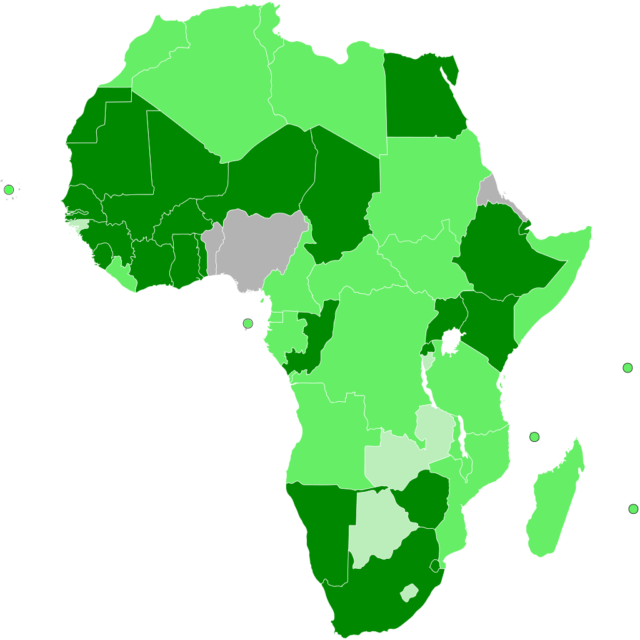
2018 map showing the African countries involved in the African Continental Free Trade Agreement.
Dark green indicates ratification, medium green are countries that signed in March 2018, and light green are countries that signed in July 2018 but did not ratify the agreement immediately.
Map by Themightyquill at Wikimedia Commons.
The poorest continent in the world is about to lend a hand to the United States. Last week, Africa implemented the world’s largest free-trade area, and that’s great news for American foreign policy. Back in December, U.S. National Security Advisor John Bolton unveiled a plan for the Trump administration’s titled the “Africa Strategy.”
The plan is simple — the United States will give less aid to Africa, instead prioritizing enhancing America’s “economic ties with the region.” Now that many African nations have unified under a single market, trading with the continent will become far easier — and a trade deal between the United States and Africa would help out everyone involved.
Streamlining Trade
The African Continental Free Trade Area (AfCFTA) trade deal officially came into force on May 30, a month after it reached the twenty-two-nation threshold needed to do so. Now, tariffs on 90 percent of the goods traded among AfCFTA member states will be removed — a move that, according to the UN, will boost intra-African trade by 52 percent in only a few years.
Given the United States’ new plans for the continent, the AfCFTA’s member states aren’t the only economies that will reap the benefits of an African single market.
A key component of the Trump administration’s Africa Strategy is to advance “U.S. trade and commercial ties” with Africa by creating “modern comprehensive trade agreements.” A single African market will be a far simpler trade partner for America. Now, only one set of trade deals will need to be negotiated with the AfCFTA — as opposed to fifty-five intricately-crafted trade deals with each small African economy. The U.S. Trade Representative has even released a report noting how time-consuming and costly it is to negotiate trade deals with each African nation. Because trade deals are long and expensive processes, creating a solitary trade deal with the AfCFTA will keep more money in the U.S. government’s purse.
June 12, 2019
The fantastic notion that Donald Trump is “at heart really a free trader”
Guest-posting at Catallaxy Files, Don Boudreaux explodes the farcical notion that President Trump is using protectionist tools with an eventual free trade goal:
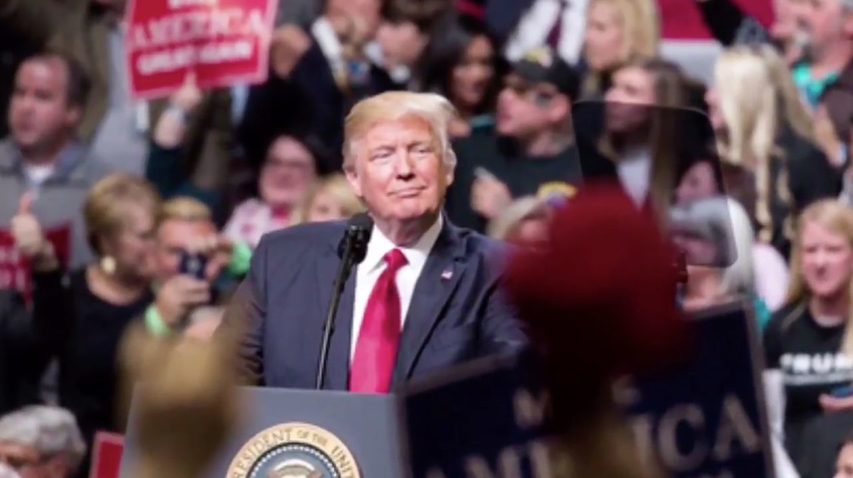
Donald Trump addresses a rally in Nashville, TN in March 2017.
Photo released by the Office of the President of the United States via Wikimedia Commons.
In the case of Donald Trump, the claim that he is at heart really a free trader who raises tariffs today with the aim of bringing about lower tariffs tomorrow — and all because he is committed to achieving free traders’ ideal goal of maximum possible expansion of the international division of labor — is especially preposterous.
Trump has pontificated on trade for decades, and every word out of his mouth clearly reveals a man who knows nothing about the economics of trade and who is as clichéd an economic nationalist as can be imagined.
Behold this line from a 1990 interview he did in Playboy: “The Japanese double-screw the US, a real trick: First they take all our money with their consumer goods, then they put it back in buying all of Manhattan. So either way, we lose.”
Let’s examine this unalloyed gem of economic witlessness.
Overlooking Trump’s outrageous exaggerations, such as his claim that the Japanese buy up “all” of Manhattan, we start by stating an obvious truth: the voluntary purchase of a good is not a transaction in which the buyer is “screwed” or has his or her money “taken.” Instead, the buyer’s money is voluntarily spent. While every person of good sense sees a foreign seller who makes attractive offers to domestic buyers as someone who improves the well-being of each buyer who accepts the offer, Trump sees this seller as a con artist or thief.
And so Trump ignores the value to Americans of the imports we purchase. In typical mercantilist fashion, he believes that the ultimate purpose of trade is to send out as many exports as possible in exchange for as much money as possible — money that in Trump’s ideal world is never spent on imports. His view on this matter is even more bizarre than that of ordinary mercantilists. For Trump, imports are not merely costs that we endure in order to export, they are actual losses. (Although it goes without saying, I’ll say it nevertheless: Trump does not understand that imports are benefits and that exports are costs.)
Furthermore, by describing the money spent on imports as “our money,” Trump reveals his belief that money earned by each American does not belong to that individual but, instead, to the collective.
Also in the fashion of the typical mercantilist, the presumption is that the nation is akin to a gigantic household whose members all share in and collectively own its money. And just as Dad justly superintends little Emma’s and Bobby’s spending to ensure that they don’t dissipate the family’s wealth, Uncle Sam must superintend his subjects’ spending in order to ensure that we don’t dissipate the nation’s wealth.
One other flaw in the above quotation from Trump’s Playboy interview is notable: he believes that foreign investments in America inflict losses on us. He doesn’t pause to consider that when we Americans sell assets to foreigners we regain ownership of some of the dollars that Trump, in his previous sentence, lamented are lost to Americans when we bought imports.
Nor does he ask what the American sellers of these assets do with the sales proceeds. Perhaps we invest some or even all of them. And if so, perhaps these new American investments will prove to be more profitable than are the investments made in America by foreigners. (By the way, contrary to another mercantilist myth, Americans are not made better off when foreigners’ investments in America fail. Quite the contrary.)
An even deeper error infects Trump’s “understanding” of foreign investment: he implicitly — and, once again, like all mercantilists — assumes that the amount of capital in the world is fixed. Only then would it be true that each American sale of assets to foreigners necessarily reduces Americans’ net financial worth (which is presumably what Trump means when he says that “we lose” when the Japanese purchase Manhattan real estate).
December 6, 2018
QotD: The best “industrial policy” is not to have one at all
Which brings us to nub of the matter: how do we increase trade and productivity, given that productivity is the thing they claim the whole schemozzle is about. There is one simple and single policy which will do both. One policy which will increase British productivity simply by allowing more trade.
This policy is so simple that even the Treasury (yes, that’s our Treasury, the one in London) was able to get right, even when being run by George Osborne. As they set out in their analysis of Brexit repercussions:
“The benefits of trade in terms of increasing productivity are well understood… greater openness to trade creates a larger market which the most productive firms expand to serve. Openness also increases competition between firms, enhancing the incentives for domestic firms to innovate or adopt new technology… It increases returns on investment, and encourages UK firms to make greater use of new technologies, either by improving the quality of inputs, or through the more effective adoption of technological innovations. Greater openness to trade also increases consumer choice and reduces prices. Lower trade costs give consumers access to cheaper imported goods and competition reduces the price of domestically-produced goods.”
In plain English, it is the competition from imports which forces British firms to buck up their act and become more productive. So here is how we improve British productivity: we move to unilateral free trade. No barriers to imports, no tariffs, just the same regulation as domestically produced items.
British industry, facing the stiffest competition from the best in the world, would be forced to meet global standards of productivity. So the best industrial policy would be to stop trying to have an industrial policy about what we can and can’t buy from beyond Britain’s borders – and the rest should take care of itself.
Tim Worstall, “The best industrial strategy for Britain is not to have one”, CapX, 2017-01-23.
November 22, 2018
QotD: They’re not “trade wars”, they’re “economic suicide bombings”
… this recent Facebook post by Steve Horwitz:
Instead of “trade wars,” let’s call them what they really are: economic suicide bombings.
Indeed so.
Like physical bombings, the economic suicide bombings that are tariffs and other trade restrictions create particular jobs by destroying real wealth. Those who then resupply the wealth that is destroyed applaud the suicide bombings, and tirelessly repeat ancient, absurd dogmas to justify the bombings. But unlike physical bombings, the victims of economic suicide bombings are largely unseen and, hence, ignored.
The people – and they are many – who cling to the dogma of protectionism do so as a matter of faith. This dogma cannot withstand the scrutiny of reason or be justified by any competent observation of reality. Yet the uncivilized and destructive religion of protectionism nevertheless flourishes, no doubt in no small part because the narrow interests of a relatively small but politically powerful cabal of producers are served by the public taking to be true all the mysticism of protectionism and its alleged miracles.
Whether or not Jesus miraculously created abundance out of the scarcity of five loaves and two fish I will not here say. I am, however, quite confident that when the likes of Donald Trump, Peter Navarro, Chuck Schumer, Bernie Sanders, and Sherrod Brown promise to perform a similar miracle – that is, to create abundance out of artificially contrived scarcity – they are either delusional about their own powers or are cynically playing their congregations for fools.
Don Boudreaux, “Quotation of the Day…”, Café Hayek, 2018-10-12.
November 14, 2018
QotD: Protectionism and competition
The ITC [U.S. International Trade Commission] acts as if American companies have a right not to be injured by foreign competition, regardless of how poorly they serve their American customers.
James Bovard, The Fair Trade Fraud, 1991.
November 8, 2018
QotD: Imports and exports
The benefit of trade is the import; the cost is the export.
Politicians just don’t seem to get this. President Obama’s official statement on “Promoting U.S. Jobs by Increasing Trade and Exports” mentions exports more than 40 times; imports, not once. His Republican critics agree: Sen. Rob Portman says that a trade agreement “is vital to increasing American exports.” More colorfully, during the 1996 presidential campaign, Pat Buchanan stood at the port of Baltimore and said, “This harbor is Baltimore is one of the biggest and busiest in the nation. There needs to be more American goods going out.”
That’s fundamentally mistaken. We don’t want to send any more of our wealth overseas than we have to in order to acquire goods from overseas. If Saudi Arabia would give us oil for free, or if South Korea would give us televisions for free, Americans would be better off. The people and capital that used to produce televisions – or used to produce things that were traded for televisions – could then shift to producing other goods.
David Boaz, The Libertarian Mind: A manifesto for freedom, 2015.
November 3, 2018
“[I]t makes no sense to punish Americans with tariffs in order to convince foreign governments to stop punishing their citizens with tariffs”
Veronique de Rugy discusses the mercantilist errors that still influence politicians and voters on free trade policies:
There are many changes to domestic policy that could help protect Americans from the predations of protectionism. For instance, when considering whether or not to grant U.S. firms “trade remedies,” such as countervailing duties, officials should have to take into account the consequences for American consumers of any tariffs they’re thinking of imposing. Policy makers aren’t currently required to do that, and one agency — the International Trade Commission—is actually forbidden from doing so.
This must change. Recent developments prove that it’s dangerous to simply assume all U.S. presidents and a critical mass of legislators will remain committed to the principles of reciprocal free trade. Buyers of imported goods or products made with imported materials — which, to be clear, is all of us — can’t depend on the economic acumen of the policy makers deciding whether or not to impose tariffs. Instead, consumer protections need to be built into the regulatory process. Because there are virtually always more workers in consuming industries downstream of the trade barrier than there are in the sector receiving the protection, a requirement to take the harm to consumers into consideration would make it very hard to impose protectionist policies.
Some free trade sympathizers have floated the possibility of Congress reclaiming its power to impose tariffs from the White House. Sen. Mike Lee (R–Utah), for instance, has introduced the Global Trade Accountability Act, which would require congressional approval for tariff increases or other “unilateral trade actions.” Unfortunately, if this otherwise well-designed bill became the law of the land, it would be akin to guarding the hen house with a hungry dog instead of a fox.
An extensive literature shows that moving tariff-setting policy away from Congress (and its parochial, locally focused interests) was a critical part of reducing protectionist influence in Washington. President Trump is terrible on this issue, but in general, a president is more likely than are members of Congress to consider the interest of the entire country — and, hence, to support broad trade liberalization.
September 14, 2018
QotD: Free market capitalism
What is free-market capitalism? Allan Meltzer, an economist at Carnegie Mellon, a Hoover Institution scholar, and onetime advisor to President Ronald Reagan, offers a classic definition. “As long as you engage in actions where your actions don’t impinge upon other people, you’re free to buy and sell anything you want,” he says, adding that free-market capitalism protects private property. Thomas Coleman, a hedge-fund veteran heading up an economic-policy shop at the University of Chicago, adds another key element: free-market capitalism functions best when people and companies can trade “without systemic distortion of prices.” Deirdre McCloskey, until last year a professor at the University of Illinois, and author of the recent book Bourgeois Equality, says, “I don’t like calling it capitalism, anyway, which was a word invented by our enemies. … I call it instead market-tested betterment, innov-ism. … That’s what’s made us rich.” McCloskey says that the heart of “betterment” is Adam Smith’s ideal of “every man to pursue his own interest in his own way” — and that “doesn’t mean a large government sector,” she emphasizes.
Free-market capitalism isn’t the same thing as radical libertarianism. Stan Veuger, an American Enterprise Institute scholar and economics lecturer at Harvard, dismisses what he calls “the anarcho-capitalist ideal”: an economy with no regulations and zero taxation. “There are places like Somalia that score well” on such purist definitions of free markets, he points out. To work well, capitalism needs “an environment where people can concentrate on being productive,” rather than, say, having private armies to assure personal safety. Free-market capitalism requires laws and rules, more than ever, now that more people live in close proximity in dense cities than ever before. Human activity leads to disputes, and disputes can be solved, or at least moderated, by resolutions that govern behavior. We often forget that markets don’t make broad public-policy decisions; governments do. Markets allocate resources under a particular policy regime, and they can provide feedback on whether policies are working. If a city, say, restricts building height to preserve sunlight in a public park, free-market actors will take the restricted supply into account, raising building prices. This doesn’t mean that the city made the wrong decision; it means that the city’s voters will risk higher housing prices in order to preserve access to sunlight. By contrast, a city that restricts housing supply and restricts prices via rent regulation is thwarting market signals — it takes an action and then suppresses the direct consequences of that action.
Nicole Gelinas, “Fake Capitalism: It’s not free markets that have failed us but government distortion of them”, City Journal, 2016-11-06.

